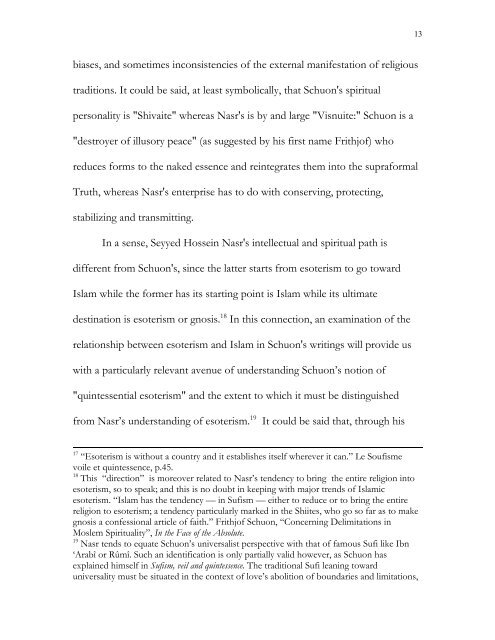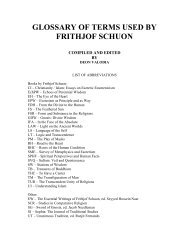Seyyed Hossein Nasr's - Sophia Perennis
Seyyed Hossein Nasr's - Sophia Perennis
Seyyed Hossein Nasr's - Sophia Perennis
You also want an ePaper? Increase the reach of your titles
YUMPU automatically turns print PDFs into web optimized ePapers that Google loves.
13biases, and sometimes inconsistencies of the external manifestation of religioustraditions. It could be said, at least symbolically, that Schuon's spiritualpersonality is "Shivaite" whereas <strong>Nasr's</strong> is by and large "Visnuite:" Schuon is a"destroyer of illusory peace" (as suggested by his first name Frithjof) whoreduces forms to the naked essence and reintegrates them into the supraformalTruth, whereas <strong>Nasr's</strong> enterprise has to do with conserving, protecting,stabilizing and transmitting.In a sense, <strong>Seyyed</strong> <strong>Hossein</strong> <strong>Nasr's</strong> intellectual and spiritual path isdifferent from Schuon's, since the latter starts from esoterism to go towardIslam while the former has its starting point is Islam while its ultimatedestination is esoterism or gnosis. 18 In this connection, an examination of therelationship between esoterism and Islam in Schuon's writings will provide uswith a particularly relevant avenue of understanding Schuon’s notion of"quintessential esoterism" and the extent to which it must be distinguishedfrom Nasr’s understanding of esoterism. 19 It could be said that, through his17 “Esoterism is without a country and it establishes itself wherever it can.” Le Soufismevoile et quintessence, p.45.18 This “direction” is moreover related to Nasr’s tendency to bring the entire religion intoesoterism, so to speak; and this is no doubt in keeping with major trends of Islamicesoterism. “Islam has the tendency — in Sufism — either to reduce or to bring the entirereligion to esoterism; a tendency particularly marked in the Shiites, who go so far as to makegnosis a confessional article of faith.” Frithjof Schuon, “Concerning Delimitations inMoslem Spirituality”, In the Face of the Absolute.19 Nasr tends to equate Schuon’s universalist perspective with that of famous Sufi like Ibn‘Arabî or Rûmî. Such an identification is only partially valid however, as Schuon hasexplained himself in Sufism, veil and quintessence. The traditional Sufi leaning towarduniversality must be situated in the context of love’s abolition of boundaries and limitations,



